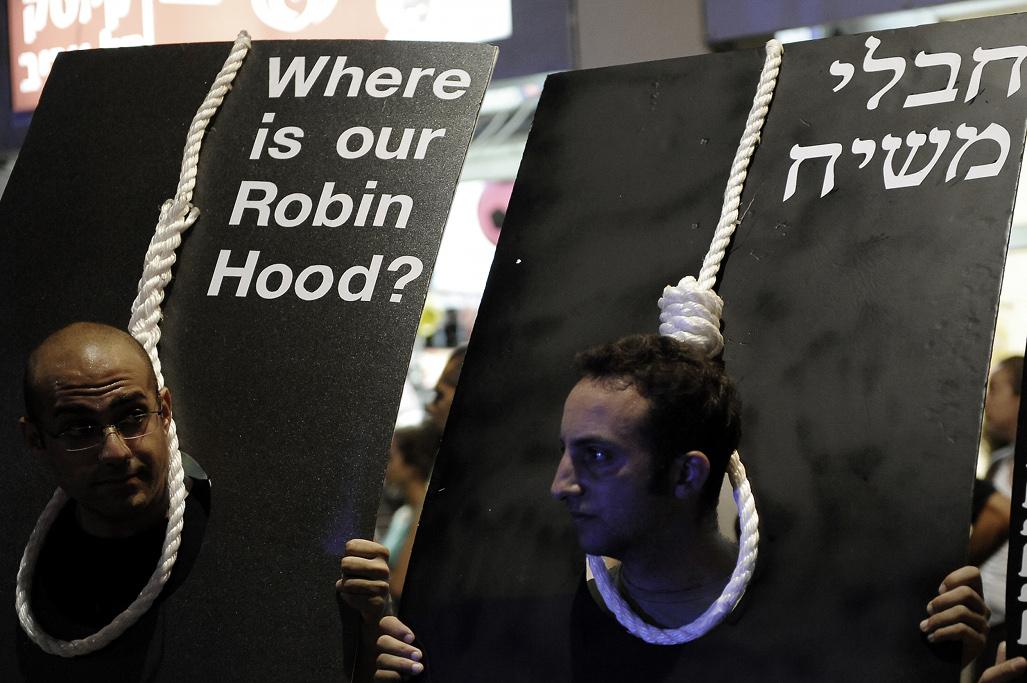Israel: Missiles and protests mark weekend
Israeli demonstrators hold nooses as they march in central Tel Aviv on August 27, 2011 to protest against the spiralling cost of living in the Jewish state, and to call for the release of Israeli soldier Gilad Shalit, kidnapped in the Gaza Strip in 2006.
JERUSALEM, Israel — It is a measure of how much life in Israel has been changed during this summer that a weekend in which 20,000 protestors take to the streets to protest unfavorable social conditions and two missiles strike in the nation’s south is viewed as a tranquil, uneventful few days.
It was another weekend of Israel’s new normal: with missiles flying in from Gaza, tension on the southern border with Egypt, discrete diplomatic maneuverings and — yes, still — ongoing social protests that refuse to disappear.
The widespread demonstrations, which for the first time this weekend included the city of Katzrin on the Golan Heights, are focusing on exorbitant housing costs and tenants’ rights.
They have engulfed the country every Saturday night during the past six weeks, and have sprouted tens of tent encampments in urban centers around the country. The largest demonstration — a million man march in this nation of seven million inhabitants — is planned for next week.
Tonight’s rallies, the most densely attended in Tel Aviv and Jerusalem, came after a brief lull caused by the deaths, a week ago, of 8 people in a terror attack near the Red Sea city of Eilat.
Protest leaders, who have shown signs of certain divisiveness this week, returned to action and diversified the nature of the social actions. Ministers’ houses are now being routinely and loudly picketed, and young activists upped the ante this weekend by squatting in abandoned municipal-owned properties in Tel Aviv and in Jerusalem.
The third such building-invasion in as many days was part of a growing national outcry against the lack of affordable housing in Israel. It was a noteworthy departure for a movement that has rigorously hewn to the law and to police permits for all of its previous activities. The first set of squatters were evicted by police. Late Saturday, the other two remained in place.
This week, the committee established by the government of Prime Minister Benjamin Netanyahu to respond to protesters' demands began its public meetings, only to be faced by protest leaders calling for the resignation of the committee’s chair, Tel Aviv University professor Manuel Trajtenberg. It remains entirely unclear whether the committee will develop public resonance or be drowned out by the clamor.
Underlining the public perception of Netanyahu’s ineffectiveness, Sunday is the 25th birthday, and sixth in captivity, of Gilad Shalit, the Israeli soldier kidnapped by Hamas and held in Gaza. For the first time his father, Noam Shalit, joined the public assemblies this weekend, though he could not find it in himself to address his absent son, as he has on previous occasions.
Instead, in Tel Aviv, he lashed out at Netanyahu, accusing the leader of being “unworthy of his post if he cannot face the costs of bringing a soldier home.”
Over 6,000 demonstrators gathered in front of Netanyahu’s Jerusalem residence on Saturday night, flooding the tent in which Gilat’s parents have been living in vigil for almost eighteen months.
The million man march called for September 3, which appeared to be in doubt just a few days ago, is being viewed as a test of the social protest movement’s seriousness and viability. The relatively low numbers of participants this weekend provoked a flurry of skepticism in Israeli media outlets, former Minister of Infrastructure and Labor member of parliament Isaac Herzog attributed the respite to preparations for the new school year, “end of August vacations and a natural ebb and flow.”
Itzik Shmuly, president of the association of Israeli University students, who has been at the forefront of the movement which emerged this summer, said he was not disappointed in the outcome. “We are not here for the purposes of head-counting. We’re in this for the marathon.”
In Egypt, to Israel’s south, an identically denominated million-man march was called for Friday, the last of Ramadan, to decry the presence of Israel’s ambassador in Cairo and, more significantly, to demand revisions in the 30-year-old peace treaty between the two countries.
Though barely a thousand turned out in the street facing the Israeli embassy in Giza, the public remonstrations, unthinkable during the hard-fisted rule of Hosni Mubarak, have caused significant jitters in Jerusalem.
Heating the flames, Arab League Secretary General Nabil el-Araby, Egypt’s former Foreign Minister, told Al-Arabiya television that the peace treaty “is not sacred, it’s not the Koran or the Bible.”
Meanwhile, in Gaza on Friday, the Islamic Jihad announced an Egyptian-brokered ceasefire to bring an end to the shower of over 60 missiles that have been lobbed into Israel during the past week, wounding 30.
On Thursday, 15 missiles landed in the south of the country. The situation remained volatile over the weekend, though it appeared to be quieting. Early Friday an Israeli air force bombardment left two Islamic Jihad leaders dead in Gaza.
Friday evening, the ceasefire was broken by two missiles that landed in Israeli territory.
Missiles and protests, this appears to be the new normal in Israel.
Every day, reporters and producers at The World are hard at work bringing you human-centered news from across the globe. But we can’t do it without you. We need your support to ensure we can continue this work for another year.
Make a gift today, and you’ll help us unlock a matching gift of $67,000!
